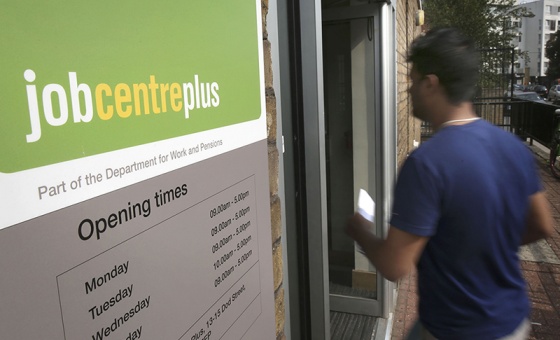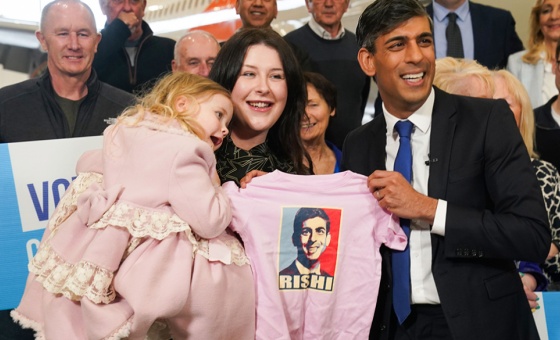This is the last article you can read this month
You can read more article this month
You can read more articles this month
Sorry your limit is up for this month
Reset on:
Please help support the Morning Star by subscribing here
TWO May conferences painted a bleak outlook for Britain’s working-class movement — unless it can wrest control of the political agenda back from politicians.
Both were conservative. That is, one was run by a group called Progressive Britain, but its keynote speech by Keir Starmer stressed Labour as the party of true conservatives.
The other was called the National Conservatism conference, though it wasn’t national in the sense of being home-grown like Therese Coffey’s turnips, since it was a project of the Edmund Burke Foundation, a US think tank.
It is the loony right who has been attracting the most mockery lately. Former Tory grandee Ann Widdecombe is at the forefront of pushing the “brave new world” of mass deprivation, with her “don’t eat cheese sandwiches if you can’t afford them” lesson in household budgeting.
How far the right has fallen. In the days of George Osborne’s “shirker and striver” rhetoric, the poor were portrayed as feckless wastrels going hungry because they’d splashed the cash on smartphones and flat-screen TVs. Now they are getting above themselves if they think a cheese sandwich should be within their means.
Not being able to afford cheese is nothing new, Widdecombe huffed, and she is right — “No Cheese” famously being one of the fake signatures on the 19th-century Chartist petitions.
It’s a common theme of today’s right. Tory MP Damian Green was likewise delighting social media last week, telling ITV viewers concerned at the water industry’s behaviour that when he was a lad everyone swam in sewage and “it was regarded as acceptable.” Our country has gone soft, what with everyone feeling entitled to luxuries like clean water and cheese sandwiches.
The Labour vision outlined at the Ambition for Britain conference held by Progressive Britain was much less entertaining.
This stage-managed New Labour reprise didn’t tolerate the cranks and conspiracy theorists of National Conservatism.
Aside from Starmer, luminaries such as Wes Streeting, Liz Kendall and the ever-insightful Stephen Kinnock were there to remind us how proper politicians talk.
The closer this comes to meaningless management speak, the more inspirational it is, at least if we assume the pullquotes Progressive Britain selected for its website were regarded by someone as the pick of the bunch. “The relationship between the public and private sector should be the centrepiece of a progressive Britain” was one, but Zubir Ahmed’s “we need to reimagine the paradigm of patient safety” surely takes the prize.
Such language is not really meaningless but a code. Like slang throughout history, it establishes you as part of the club, in this case the managerial elite of Britain’s strongly parasitical capitalist model, in which “public services” are primarily a means of channelling public money into private pockets and the existence of the services themselves is a secondary consideration.
Ahmed is certainly in the club. A former classmate of Scottish Labour leader Anas Sarwar, a fact they both deny influenced his selection as Labour candidate for the Glasgow South West constituency in a contest from which Labour’s left-wing 2017 and 2019 candidate Matt Kerr (now the Morning Star’s Scotland reporter) was blocked from participating.
So on one side, we have an unruly right, railing at immigrants, telling us not to eat cheese and attempting to build a popular political current around “faith, family and flag,” in the words of the National Conservatism conference’s director James Orr.
On the other, we have Blairite drivel, promises of “mission-based government” and “growth as a progressive project.”
The fault line should be familiar. It is Trump versus Clinton (or Biden). It is Le Pen versus Macron. It divides a political arena in which the interests of the working class are nowhere to be seen.
It is not even clear that it represents a real division at all. After all, Starmer deploys “family and flag” rhetoric regularly (he prefers “values” to “faith,” because he is “progressive”). Both main parties want more private-sector involvement in the NHS, both talk up the threat from refugees; both now even compete for ownership of the term Conservative.
More insidiously, both agree on lowering our expectations of life and work. Streeting’s insistence that we cannot keep “pouring money into a 20th-century model of care” (in fact British health spending is lower per head than in neighbouring states) should not, of course, call into question the commitment of today’s Labour Party to an NHS that runs through Starmer’s family like a “stick of rock” or is part of his “DNA,” depending on the speech.
But it harps on the same tune as Widdecombe’s cheese sandwich.
We mock the latter, but we should take it seriously — because the ruling class has already proved extremely successful at lowering expectations.
We do not enjoy a rail or bus network as reliable or extensive as our parents’ generation. Pensions are stingier, jobs are less secure. It’s harder to get a house.
What’s “normal” is what we grow up with and that can be changed: the medieval peasant did not expect the state to educate their children, and the Victorian worker did not expect public healthcare. Widdecombe and Green are blunt — but not crazy. They want us to accept things getting worse.
And so does Labour. The biggest front in the current drive to lower expectations is the ruin of our NHS. Both parties emphasise that we cannot expect the level of service we used to in the past, it is unrealistic, old-fashioned, and unaffordable.
This surely underlines the need to retire the awful term “progressive.” As in Tony Blair’s day, it is deliberately misleading, associating change with advance, whatever the content of that change.
Public-sector “reform” has been a privatising rip-off for decades and yet Starmer still claims the public is unhappy with “unreformed” services, based on our dissatisfaction with the results of that reform. Deregulation has been a disaster for working-class people from zero-hours contracts to Grenfell.
Nor are social changes, themselves reflective of economic trends, necessarily positive, as we see in the rise of individualist and anti-materialist ideologies that has accompanied deindustrialisation and the retreat of organised labour and class consciousness.
Grasping this is key to a real left advance, an advance towards socialism. The liberal appeal is always to rally behind them to see off the far right — yet because the Progressive Britain platform does not address any of the anxieties the far right exploit, it leaves the door to it wide open.
It is true for example that the voices at the National Conservatism conference complaining about low “native” birth rates are pushing racist (“great replacement theory”) and sexist (“women should be at home bearing kids”) ideologies.
But the narrative relies on real anxieties about the cost of raising a family, something that was once possible on one income but is increasingly difficult even on two. Defeating this racism and sexism depends on resolving the issues around pay, housing and childcare.
Neither conference offered a way forward for working-class people. But that doesn’t mean the situation is hopeless.
The scale of industrial action over the past year is one reason. Workers are “refusing to be poor any more” and battling to save our NHS and schools in defiance of the don’t-let-them-eat-cheese-mongers.
Another is that this division of politics is artificial. Its lack of appeal in the face of a real alternative was demonstrated when Change UK, an attempt to replace the socialist opposition to Boris Johnson’s nationalism with a Progressive Britain-style 1990s tribute act, completely flopped.
In the end, yanking Labour back to liberal managerialism had to rest on entirely undemocratic methods.
The current leader had to convince the party he stood for the exact opposite of his actual politics, then enforce a U-turn in approach by banning discussion, expelling members and rigging selections. This has worked effectively inside Labour, but its lack of appeal nationally is clear in lacklustre election results even while the Tories implode.
The appetite for a real alternative is still present. The huge popularity of the strike wave shows it, as do the polls in which a majority doggedly backs the public ownership policies our politicians tell us are off the menu.
How to turn that widespread feeling into a movement? Picket line rallies, campaigns for clean water or price controls are good places to start.
Events like this spring’s Morning Star conference, with strike reports, union reps and socialists of multiple political traditions engaging in debate, or this summer’s Organise Now! Troublemakers at Work industrial summit in Manchester are in the right spirit — but we must do so much more.
Like the right and the so-called centre, the left needs to be talking, co-operating, and strategising.
Ben Chacko is the editor of the Morning Star.

 Ben Chacko
Ben Chacko










